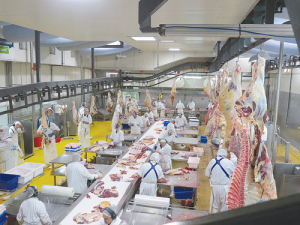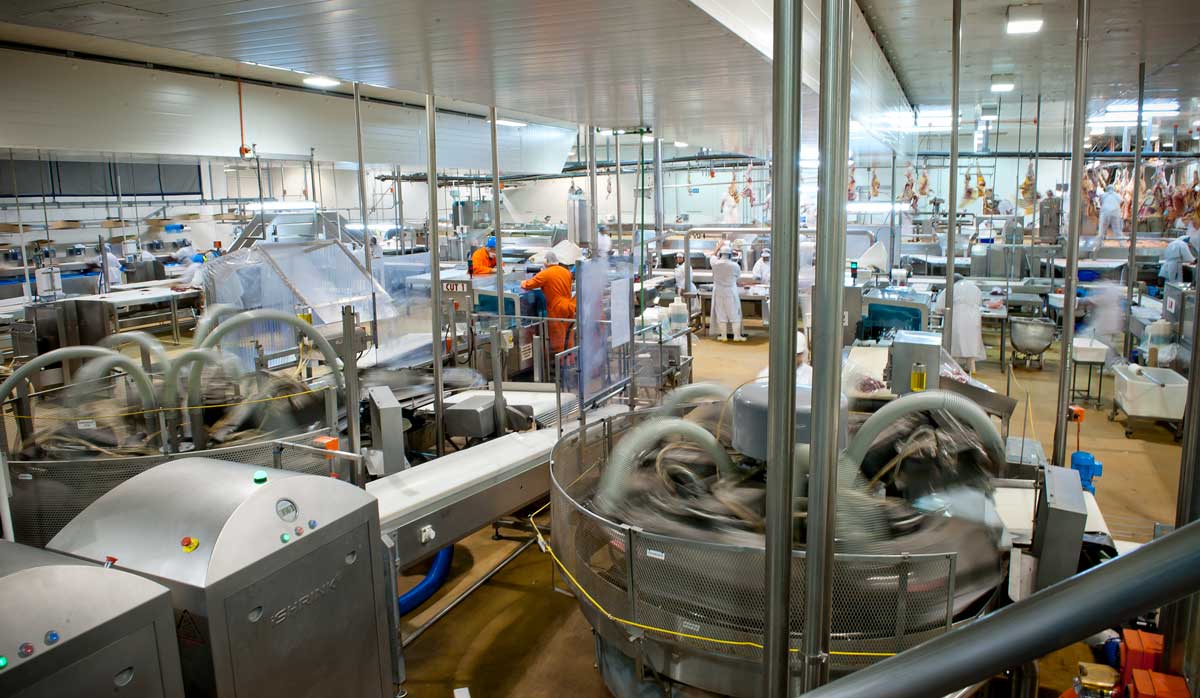NZ Catchment Groups Thrive with ‘Source to Sea’ Approach
The most successful catchment groups in NZ are those that have 'a source to sea' approach.
 The protocols will enable processing companies to continue operation under COVID-19 alert level 4 restrictions.
The protocols will enable processing companies to continue operation under COVID-19 alert level 4 restrictions.
Farmers are being urged to act now in response to new COVID-19 protocols for processing companies that will impact processing capacity.
Beef + Lamb New Zealand and the Meat Industry Association have released a checklist to assist farmers, available at the bottom of this article.
The strict set of rules and requirements for processing companies were released today by the Meat Industry Association (MIA) after consultation with the Ministry for Primary Industries (MPI).
The protocols were designed with close consultation between processing and exporting companies, their people and the Meat Workers Union.
The protocols aim to ensure the processing and export sector’s continuing operations do not compromise people’s safety or contribute to the spread of COVID-19.
The schedule of requirements within plants include physical distancing, personal hygiene, transport to and from work, further increased cleaning/disinfection of processing areas and the use of Personal Protective Equipment.
The new operating procedures will have significant implications for farmers through a reduction in processing capacity across the industry, and farmers are likely to face delays in getting their livestock processed.
The reduction in processing capacity is going to exacerbate this situation further. There are also potential feed issues developing in the South Island with low winter cropping yields following the recent flooding.
 |
|---|
|
Beef + Lamb New Zealand and the Meat Industry Association have released a checklist to assist farmers as COVID-19 restrictions look to reduce processing capacity. |
Beef + Lamb New Zealand and the Meat Industry Association says those farmers likely to be affected should act now.
The industry bodies heave released the following checklist, collated from their resources and industry experts, to consider:
1. Get an accurate tally of how many stock you wish to have processed, and by when.
2. Talk to your meat company representative to find out what’s changed and identify the implications for you – how many animals delayed and for how long. Let them know your processing needs.
3. Complete a Feed Budget from now until Spring, based on likely processing dates (B+LNZ has spreadsheets, worksheets and feed budget software to help, or your trusted advisor can assist):
• Look at your feed situation do a stocktake of pasture cover plus readily available supplements and forage crops
• What’s my pasture going to grow over the next while?
• What will be the pasture growth response to fertiliser N (urea, DAP and the like) and how quickly can I get it on?
• What’s my feed demand going to be and what’s the additional demand with those extra mouths I’m going to have to carry? Slot all of these figures into a feed budget?
• What’s that mean for my ongoing feed cover, my seasonal pasture cover targets and animal production targets?
4. If there’s a feed deficit what are my options:
• For ewes, cows, finishing stock, trading stock, young stock
• If one class of stock is unable to be processed, are there other stock classes you could and should consider processing instead, or is the store market an option?
• Should I defer planned hogget mating?
• Use a ram harness to draft off mated ewes as early as possible onto maintenance feed
• Nitrogen – temperature, moisture, feed cover – what response will I get?
• Other supplements; barley, baleage, PKE. Consider price, availability, equipment, utilisation, labour
• Grazing out – what stock class, where, what performance arrangements
5. Look at the cashflow consequences and talk to your financial advisors and your financiers as early as possible.
6. Keep an eye on yourself and your neighbours talk about the issues over the fence (with appropriate distancing) or on the phone and don’t hesitate to reach out to your other trusted advisors.
7. Consider a ‘virtual discussion group’ or ‘virtual woolshed meeting’ – use tools like Skype or Zoom to have a discussion with other farmers. A problem shared is a problem halved.
8. If you want to talk to someone, confidentially, about your situation or the situation of someone you are concerned about, contact Rural Support Trust.
9. Ensure that you have good on-farm COVID-19 risk management processes which will ensure the safety of your own people and those essential services you work with.
10. Recognise that given the current COVID-19 restrictions across the industry things will take longer so acting early is critical.
You can find this checklist and other key feed resources here.
B+LNZ is currently working with MPI and other agricultural organisations to set up a nationwide system where farmers can ring up to get help to determine how much feed they have, and identify options for managing the situation.This system is expected to be launched later this week.
B+LNZ is also holding a weekly drought drop in phonecall, where we will have a different expert each week providing advice on managing the dry.You can register here.
For more general advice for farmers on managing their farm under the COVID-19 lockdown, farmers can visit the B+LNZ dedicated COVID website page:https://beeflambnz.com/news-views/coronavirus-covid-19.
Dairy Women's Network (DWN) has announced that Taranaki dairy farmer Nicola Bryant will join its Trust Board as an Associate Trustee.
Rural Women New Zealand (RWNZ) says it welcomes the release of a new report into pay equity.
Red meat exports to key quota markets enjoyed $1.4 billion in tariff savings in the 2024-25 financial year.
Remediation NZ (RNZ) has been fined more than $71,000 for discharging offensive odours described by neighbours as smelling like ‘faecal and pig effluent’ from its compositing site near Uruti in North Taranaki.
Two kiwifruit orchards in the Bay of Plenty and one in Northland are this year's finalists for the Ahuwhenua Trophy competition.
The Government's chief science advisor, Dr John Roche says the key objective for the science sector in the coming year is bedding down the reforms which sees the merger of the previous entities.

OPINION: A mate of yours truly reckons rural Manawatu families are the latest to suffer under what he calls the…
OPINION: If old Winston Peters thinks building trade relations with new nations, such as India, isn't a necessary investment in…